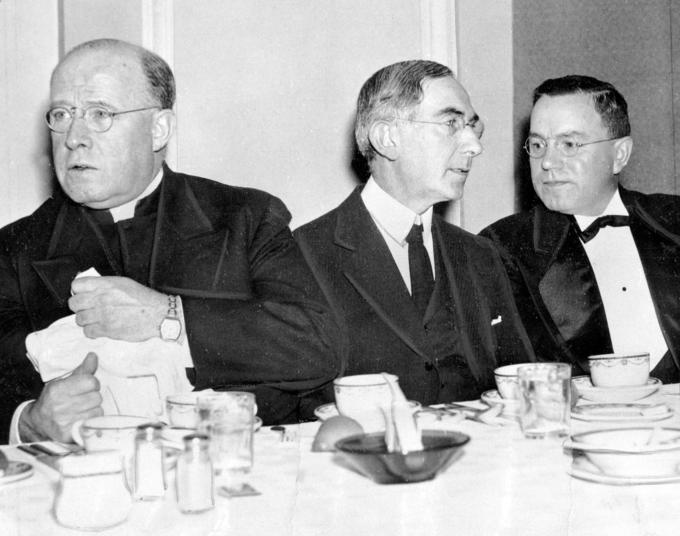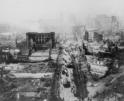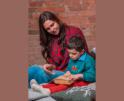
Culture
On a Sunday afternoon, Sept. 15, 1929, an event occurred that would have a lasting effect on greater Boston's 800,000 Catholics. On that day, nearly 88 years ago, Father Michael J. Ahern, S.J. did something no priest in Boston had ever done before: he introduced a weekly radio program specifically for Catholics. While that may not sound very remarkable in our internet, cable television, and social media age, back in 1929, it was a very important occasion. Back then, radio was the dominant mass medium, and being on the air could turn a previously unknown performer or announcer into a celebrity.
Radio became an obsession for Bostonians during the 1920s; families gathered in their "radio room" to listen to their favorite programs. The most popular shows were the radio dramas (which would later be called "soap operas") and people were also delighted to hear their favorite songs. Boston stations also provided news, sports, and weather, and as far back as 1922, there were inspirational messages and Bible readings from ministers and rabbis; there were even live broadcasts from area houses of worship. But if you were a Catholic in those formative years of radio, there were no programs that featured a priest.
Then as now, Boston was overwhelmingly Christian, yet one of the most popular radio preachers of the 1920s was Jewish: Harry Levi, the rabbi of Boston's Temple Israel. An eloquent speaker, he developed a large following of both Jews and non-Jews. For most Bostonians, in that era before interfaith events became more common, listening to a rabbi was a new experience; to Rabbi Levi's surprise, there were many non-Jews tuned in to his broadcasts over station WNAC (today WRKO), and they enjoyed hearing him discuss the Old Testament; in fact, many sent him fan mail and asked for autographed copies of his sermons. The same phenomenon occurred for some Protestant ministers, including Rev. Henry Knox Sherrill; he broadcast over station WEEI, and he never expected that the power of radio would turn members of Boston's clergy into radio stars.
But for whatever reason, and despite radio's growing influence, it wasn't until 1928 when the Catholic church became more active in broadcasting. That year, there were a few radio programs of interest to Catholics -- usually on special occasions. For example, on May 20, there was a Mass to honor military veterans, held at Fenway Park, and on Christmas day, there was a Mass from the Cathedral of the Holy Cross; both were officiated by Cardinal O'Connell. Undoubtedly, these broadcasts led Boston's Catholics to hope for a more frequent presence on the air. They finally got their wish in mid-September 1929 when Father Ahern debuted the weekly "Catholic Truth Hour," also called the "Catholic Truth Period."
It was no accident that Cardinal O'Connell chose Father Ahern to host Boston's first regular Catholic broadcasts. While most people in 2017 are not familiar with the name of Michael J. Ahern, in his day, he was well-known. Father Ahern was unique for his era: in addition to being a Catholic priest, he was also a scientist. His expertise was in geology and climate studies, and he would frequently point out (including on his radio program) that science and religion were not incompatible. By the time "The Catholic Truth Hour" made its debut in 1929, he already had a distinguished career in academia: beginning in 1902, he taught Chemistry and Biology at Boston College, and by 1911, he became head of the Chemistry and Geology department at Canisius College in Buffalo; in 1919, he was named the college's president. He left in 1923, and became the head of the Chemistry Department at Holy Cross College in Worcester. Two years later, Father Ahern was named head of the department of Geology and Chemistry at Weston College (today part of Boston College), where he would remain for the next several decades. The research he did there in climatology and seismology became nationally known, and by 1940, he was the director of the Weston Observatory, which to this day is involved in monitoring the Northeast for possible earthquake activity.
There was one other reason why Father Ahern was respected: he was a trailblazer in teaching religious tolerance. As a priest, he was faithful to Church doctrine, and by today's standards, he would be considered a conservative. Yet throughout his life, he always went out of his way to make people from different faiths feel welcome, and he was widely praised for his efforts to fight against bigotry.
Born in New York City on May 25, 1877, Father Ahern learned religious tolerance at a young age. He was raised in a neighborhood where people from various religious backgrounds all lived near each other. In fact, in a 1929 talk he gave at Harvard, he recalled two of his closest boyhood friends. "Johnny went to the Lutheran Church... Jakey to the Synagogue, and I went to the (Catholic) church. No one of us ever discussed or questioned the right of the other to go to his own church -- it never entered our minds." This attitude of tolerance was one reason people who met Father Ahern felt comfortable talking to him; and it soon made him equally popular with his radio listeners.
Father Ahern's new radio program, while aimed at Catholics, was similar in purpose to what Rabbi Levi was trying to do: their programs became vehicles for refuting myths and stereotypes. In the 1920s, non-Catholics held many erroneous beliefs about Catholics; Father Ahern was now able to address them directly. He not only invited well-known Catholic theologians to speak; he also included a question period, where listeners could write in, and he would respond. And as Rabbi Levi had discovered, Father Ahern too found that many of his listeners were not from his religion; according to the fan letters he received, listeners were fascinated by his explanations of what Catholics believed and how they worshipped. And one thing that helped him gain a wider audience was that his program was carried on the Yankee Network, which meant radio listeners throughout New England had the opportunity to hear him every week.
Given that Rabbi Levi and Father Ahern both broadcast from the same station (WNAC) on the same day, it is not surprising that they became friends; their theologies may have differed, but both men shared a strong desire to combat prejudice and to teach respect for other faiths. In November 1929, they both spoke at the Calvert Roundtable, an interfaith event sponsored by Harvard. Reporters who covered the conference focused on the two unlikely friends -- the rabbi and the priest. One reporter from Literary Digest observed that these two had "agreed to (declare) war on religious intolerance." Rabbi Levi and Father Ahern would continue to be on panels and attend conferences together throughout the 1930s; Father Ahern even participated in several events at Temple Israel, which was almost unheard of at that time. For example, in October 1936, when a banquet was held to honor Rabbi Levi for his years of service to his synagogue, Father Ahern was there to pay tribute to him.
If you study Father Ahern's sermons and speeches, you will not find any anti-Jewish statements; this was in marked contrast to another radio priest of that era, the controversial Father Charles Coughlin, who used his national radio program to disseminate intolerance. In Boston, Father Coughlin had some fans, but Michael J. Ahern was not one of them. In fact, Father Ahern publicly disputed the idea that it was acceptable for any Catholic to participate in anti-Semitism. Father Ahern became so identified with teaching respect for Judaism that Boston's largest Jewish newspaper, the Jewish Advocate, gave him an award in 1937, praising him for "advancing the cause of tolerance and goodwill."
Throughout his career, Father Ahern also promoted courtesy and civility. A frequent public speaker before both Catholic and non-Catholic audiences, he stated that he objected to name-calling. "I have never called a person a heretic," he said; and when talking about people from other faiths, "I always refer to others as our non-Catholic friends." Father Ahern hosted the Catholic Truth Hour from its inception in 1929 till he retired in September 1950. Along the way, he also reported on major events such as the death of Cardinal O'Connell in April 1944; he explained Catholic funeral practices to the non-Catholics in his radio audience, as he single-handedly described the entire three-hour service from Holy Cross Cathedral. Subsequently, he was the announcer for a more joyful event, the installation of Archbishop Richard J. Cushing.
It is no exaggeration to say that Father Ahern was beloved in Boston. When he was not working as the "Radio Priest," he devoted himself to teaching and doing scientific research, while always making time for charitable causes -- he had long been active in the National Conference of Christians and Jews, and while he did not live to see the Second Vatican Council, it is safe to say that his views would have fit very nicely with those of Pope John XXIII. When he died in January 1951, at the age of 74, more than 2,000 people attended the funeral Mass. In paying tribute to him, The Pilot said he was "a good and faithful servant... an outstanding example of gentlemanliness and scholarship...(who) shared his wisdom with the young and his strength with the weak."
Father Michael J. Ahern, S.J., was in many ways a man ahead of his time: the first priest in Boston to use radio to teach about the Catholic religion; and a man who lived a life of kindness and compassion for Catholics and non-Catholics alike. In our angry and confrontational world, where too many people regard "the other" as an enemy, the way that Father Ahern lived his faith should serve as an inspiration to anyone, no matter their religion. Given all that he accomplished, in science, in interfaith tolerance, and in providing Catholics with a credible and eloquent presence on radio, Father Ahern deserves our thanks, and he also deserves to be remembered.
DONNA L. HALPER, PHD IS A PROFESSOR OF COMMUNICATION AND MEDIA STUDIES AT LESLEY UNIVERSITY IN CAMBRIDGE. SHE IS JEWISH, AND FIRST ENCOUNTERED FATHER AHERN WHILE SHE WAS DOING RESEARCH ABOUT BOSTON'S "RADIO RABBI," HARRY LEVI.
Recent articles in the Culture & Events section
-
Boston and the nation respond to the San Francisco Earthquake of 1906Thomas Lester
-
See you in the storyLaura Kelly Fanucci
-
'Dignitas' and the mediaRussell Shaw
-
Scripture Reflection for April 14, 2024, Third Sunday of EasterDeacon Greg Kandra
-
St. Helena's House is established in the South EndThomas Lester


















